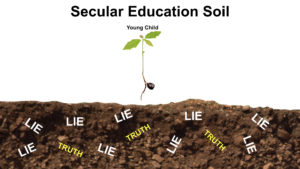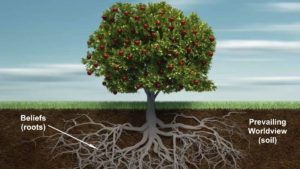 We have been looking at what it takes to grow healthy trees. Growing healthy trees is a metaphor for raising young people to be disciples of Jesus who can engage today’s postmodern culture by thinking and acting from a biblical worldview. In last week’s blog I asked the readers to identify some of the lies that are foundational to a secular worldview. These lies are what keeps people and societies in bondage. If we don’t identify them, we will not be able to break the chains that they have on our individual lives, families, churches and communities. Here is the list of lies that I posted last week. I have added some additional lies that various readers shared with me last week.
We have been looking at what it takes to grow healthy trees. Growing healthy trees is a metaphor for raising young people to be disciples of Jesus who can engage today’s postmodern culture by thinking and acting from a biblical worldview. In last week’s blog I asked the readers to identify some of the lies that are foundational to a secular worldview. These lies are what keeps people and societies in bondage. If we don’t identify them, we will not be able to break the chains that they have on our individual lives, families, churches and communities. Here is the list of lies that I posted last week. I have added some additional lies that various readers shared with me last week.
- Man’s happiness is the most important goal in life.
- The government is to provide for all of its citizen’s needs.
- Gender is a personal choice.
- Tolerance is the ultimate value that humans are to exhibit.
- Man is a mere mechanistic creature of nature of equal value to all other forms of life.
- Making money is the primary goal of work and one works to be able to consume.
- Popularity is important in determining one’s identity.
- Creation Evolution is presented as a scientific fact. Young earth is presented as a child’s story.
- I cannot be fulfilled unless I have ____________________
- The government is responsible to provide all of one’s needs.
However, it is not enough just to simply identify a long list of lies that are enslaving us. We must go beyond merely knowing what they are to understanding how they actually impact our lives.
This leads us to another step that we must take if we are going to educate our children to think and act from a biblical worldview. It is important to know how these lies that in a secular worldview soil get into our lives. Let’s go back to the illustration of a tree planted in the ground. I shared with you how I learned from the work of the Disciple the Nations that the soil represents the prevailing worldview of the culture. The roots of the tree then represent the beliefs of the individual or group.
When a tree is planted in the soil, its roots immediately start trying to find nutrients in the soil. Those nutrients are absorbed by the roots. When we plant our children in soil that is based on a secular, man-centered worldview, our children will immediately begin absorbing the lies from that worldview soil into their roots.
When we plant our children in soil that is based on a secular, man-centered worldview, our children will immediately begin absorbing the lies from that worldview soil into their roots.
As this takes place, the falsehoods from the prevailing worldview form the beliefs of the person absorbing them. The roots or beliefs will continue to grow and seek out more of the lies that are found in the secular worldview that is feeding them. In turn, they develop more and deeper held beliefs based on the worldview from which they are feeding.
When you look at the list of lies that a secular worldview feeds a person, family, church, or a community, what would you say is the most devastating lie in the list. Again, you can do this on your own or get together with some other Christians and discuss it together. Once you identify the lie you want to focus on, try to identify the beliefs that this lie produces. Here are some questions you need to answer.
- What are some of the beliefs that are formed by individuals or groups that come from this lie?
- Where did this lie come from?
- Can you trace the historical roots of this lie?
In doing this exercise, it is important to distinguish between beliefs and actions. Actions always follow beliefs because we live what we really belief. We need to recognize and understand that false beliefs are a result of feeding off of lies from a secular, man-centered worldview. I look forward to seeing what lie you choose to study and what beliefs you see coming from this lie. Next week we will study how the false beliefs of a root system formed by the lies of a secular worldview shapes the lives of individuals.








Recent Comments